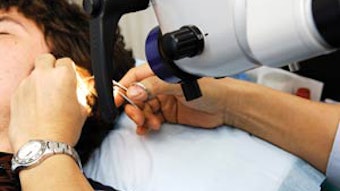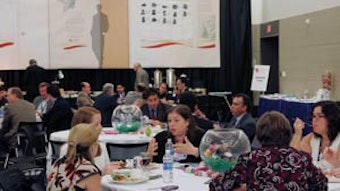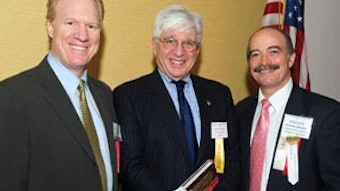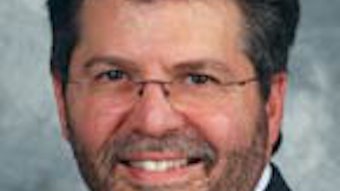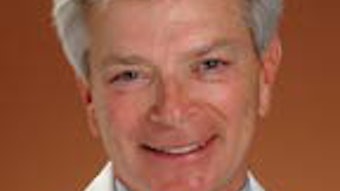Bangladesh: Tackling Health Issues and Implementing Social Business
Michael D. Seidman, MD Chair, Board of Governors In June 2010, the Coalition for Global Hearing Health meeting was held at Academy headquarters, organized by James E. Saunders, MD, and Jackie Clark, PhD. During the meeting, 27 countries that have significant healthcare concerns were represented. Samantha Caccamo, founder of Social Business Earth (SBE), presented issues about Bangladesh. She planned to go there for two weeks, and solicited my participation. Our visit to this incredible country in November 2010 was too short, but productive. The country is roughly the size of Iowa with more than 160 million inhabitants and an infrastructure that cannot support the population. We met with members of the health department; Professor Pran Gopal Datta, an otolaryngologist who is vice chancellor of Bangladesh’s only medical university; Professor M. Nurul Amin, who started the Society for Assistance to Hearing Impaired Children (SAHIC), the only ear hospital in the city; and Professor Muhammad Yunus, Nobel Peace Laureate, founder of the Grameen Bank, and originator of the concept of Social Business (SB). SBs are organizations designed to solve a pressing need such as poverty, agriculture, technology, or health. Each organization must be financially self-sustaining and is allowed to make a profit, with the caveat that the profit is re-invested to expand the reach of the SB. The only profit a founder or investor may reap — perhaps the most important — is the profit gained by the heart, knowing that you are involved in selfless pursuits. Several SBs are already in place, such as the Grameen Eye Hospital, which serves the rural poor and provides inexpensive cataract surgery, and Grameen Danone, where the CEO of Dannon Yogurt and Professor Yunus collectively serve the poor and malnourished. They produce Shokti Doi, a yogurt fortified with iron, calcium, and other nutrients, which sells for seven “taka,” or about 10 cents. If children consume two servings a week for eight months, the nutrients mitigate malnutrition. The hearing issues are staggering — more than 11 million people in Bangladesh are deaf. The World Health Organization (WHO) suggests that 80 percent is acquired and 50 percent is preventable through proper immunizations, education, and early intervention. Preventing these problems would save billions in lost productivity, not to mention the huge emotional and psychological toll this situation has on the affected person and their families. Most with sensorineural hearing loss (SNHL) receive no education, are relegated to their homes, and become ostracized and the target of abuse, further perpetuating the stigma associated with SNHL. Professor Amin started a hospital for hearing issues. He now has 16 surgeons, audiologists, nurses, and technicians. They are eager for surgeons to come for two weeks at a time to share surgical and diagnostic expertise. He also started a school for the deaf and teaches 220 children ages 3-6 with the intent to mainstream them. We worked with Professor Datta at the Medical University of Bangladesh, where he was appointed by the Prime Minister to be the vice chancellor. He notes the most pressing problem is population control, and would like to see birth control as the primary concept to be disseminated. We spoke of vaccination issues and he thinks he could run a program through the university. We then worked with Professor Yunus and his team at the Grameen Bank (GB), including the managing director, Imamus Sultan, who oversees the two eye hospitals and 51 primary care clinics across the country, and Lamiya Morshed, executive director of the Yunus Centre. The GB has agreed to distribute vaccines to patients at all 51 centers if we are able to start the program and lower the cost of the vaccine. We were in awe and fully inspired with the important work being done by the GB, and we had the opportunity to evaluate areas of need. Specifically, we will address the following: reduce SNHL with immunizations and education; set the stage for the creation of the Grameen Ear Hospital; train professionals and provide care to patients using telemedicine; employ simulation centers to fill the void created by the legalities of allowing visiting physicians “hands on training” while in the U.S.; describe the need for rehabilitation of those already affected by SNHL; proactively address the issues of rickets (fully preventable); and address the issue of population control. Ms. Caccamo stayed on to visit the traumatic brothels where 11- and 12-year-old girls are forced to take Oradexon, a dangerous cow steroid to enhance their physical appearance and look more appealing to their clients. She visited Chakaria and the Cox’s Bazaar area, where rickets is rampant and largely preventable, and she worked with the Minister of Health. I am convinced that when you have the support of the GB, the Minister of Health, the vice chancellor of the Medical University, and hard-working, generous people in humanitarian efforts, change will happen. With the enormous needs of these people and the lack of resources, the SB concept created by Professor Yunus is a model of success, and the time to act is now. Our plan is to open an Ear Hospital with GB. We will need 15 audiologists and otolaryngologists from Europe and the U.S. who are willing to go to Bangladesh in rotation for a period of two weeks at a time to train the local ENT doctors and assistants. Travel and other expenses are the volunteer’s responsibility. If you wish to share your expertise at the Ear Hospital, please contact me (Mseidma1@hfhs.org) or Samantha Caccamo (samantha@socialbusinessearth.org). We are still at the early stages of our planning but we’d like to hear from you!
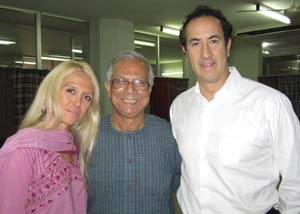 Samantha Caccamo, Nobel Laureate Professor Yunus, and Michael D. Seidman, MD, at Yunus Center.
Samantha Caccamo, Nobel Laureate Professor Yunus, and Michael D. Seidman, MD, at Yunus Center.Michael D. Seidman, MD
Chair, Board of Governors
In June 2010, the Coalition for Global Hearing Health meeting was held at Academy headquarters, organized by James E. Saunders, MD, and Jackie Clark, PhD. During the meeting, 27 countries that have significant healthcare concerns were represented. Samantha Caccamo, founder of Social Business Earth (SBE), presented issues about Bangladesh. She planned to go there for two weeks, and solicited my participation.
Our visit to this incredible country in November 2010 was too short, but productive. The country is roughly the size of Iowa with more than 160 million inhabitants and an infrastructure that cannot support the population. We met with members of the health department; Professor Pran Gopal Datta, an otolaryngologist who is vice chancellor of Bangladesh’s only medical university; Professor M. Nurul Amin, who started the Society for Assistance to Hearing Impaired Children (SAHIC), the only ear hospital in the city; and Professor Muhammad Yunus, Nobel Peace Laureate, founder of the Grameen Bank, and originator of the concept of Social Business (SB).
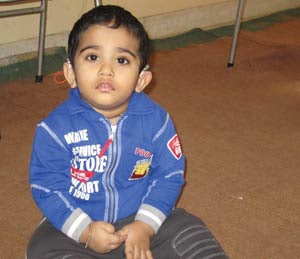 This boy had bilateral implants in Singapore and is being rehabilitated at Professor Amin’s hospital.
This boy had bilateral implants in Singapore and is being rehabilitated at Professor Amin’s hospital.SBs are organizations designed to solve a pressing need such as poverty, agriculture, technology, or health. Each organization must be financially self-sustaining and is allowed to make a profit, with the caveat that the profit is re-invested to expand the reach of the SB. The only profit a founder or investor may reap — perhaps the most important — is the profit gained by the heart, knowing that you are involved in selfless pursuits.
Several SBs are already in place, such as the Grameen Eye Hospital, which serves the rural poor and provides inexpensive cataract surgery, and Grameen Danone, where the CEO of Dannon Yogurt and Professor Yunus collectively serve the poor and malnourished. They produce Shokti Doi, a yogurt fortified with iron, calcium, and other nutrients, which sells for seven “taka,” or about 10 cents. If children consume two servings a week for eight months, the nutrients mitigate malnutrition.
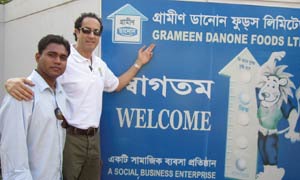 Dr. Seidman (right) visits Grameen Danone, where the CEO of Dannon Yogurt and Professor Yunus collectively serve the poor and malnourished with Shokti Doi, a yogurt fortified with iron, calcium, and other nutrients.
Dr. Seidman (right) visits Grameen Danone, where the CEO of Dannon Yogurt and Professor Yunus collectively serve the poor and malnourished with Shokti Doi, a yogurt fortified with iron, calcium, and other nutrients.The hearing issues are staggering — more than 11 million people in Bangladesh are deaf. The World Health Organization (WHO) suggests that 80 percent is acquired and 50 percent is preventable through proper immunizations, education, and early intervention. Preventing these problems would save billions in lost productivity, not to mention the huge emotional and psychological toll this situation has on the affected person and their families. Most with sensorineural hearing loss (SNHL) receive no education, are relegated to their homes, and become ostracized and the target of abuse, further perpetuating the stigma associated with SNHL.
Professor Amin started a hospital for hearing issues. He now has 16 surgeons, audiologists, nurses, and technicians. They are eager for surgeons to come for two weeks at a time to share surgical and diagnostic expertise. He also started a school for the deaf and teaches 220 children ages 3-6 with the intent to mainstream them.
We worked with Professor Datta at the Medical University of Bangladesh, where he was appointed by the Prime Minister to be the vice chancellor. He notes the most pressing problem is population control, and would like to see birth control as the primary concept to be disseminated. We spoke of vaccination issues and he thinks he could run a program through the university.
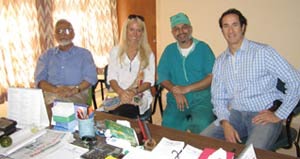 Professor Amin, Samantha Caccamo, another ear surgeon, and Dr. Seidman.
Professor Amin, Samantha Caccamo, another ear surgeon, and Dr. Seidman.We then worked with Professor Yunus and his team at the Grameen Bank (GB), including the managing director, Imamus Sultan, who oversees the two eye hospitals and 51 primary care clinics across the country, and Lamiya Morshed, executive director of the Yunus Centre. The GB has agreed to distribute vaccines to patients at all 51 centers if we are able to start the program and lower the cost of the vaccine.
We were in awe and fully inspired with the important work being done by the GB, and we had the opportunity to evaluate areas of need. Specifically, we will address the following:
- reduce SNHL with immunizations and education;
- set the stage for the creation of the Grameen Ear Hospital;
- train professionals and provide care to patients using telemedicine;
- employ simulation centers to fill the void created by the legalities of allowing visiting physicians “hands on training” while in the U.S.;
- describe the need for rehabilitation of those already affected by SNHL;
- proactively address the issues of rickets (fully preventable);
- and address the issue of population control.
Ms. Caccamo stayed on to visit the traumatic brothels where 11- and 12-year-old girls are forced to take Oradexon, a dangerous cow steroid to enhance their physical appearance and look more appealing to their clients. She visited Chakaria and the Cox’s Bazaar area, where rickets is rampant and largely preventable, and she worked with the Minister of Health.
I am convinced that when you have the support of the GB, the Minister of Health, the vice chancellor of the Medical University, and hard-working, generous people in humanitarian efforts, change will happen. With the enormous needs of these people and the lack of resources, the SB concept created by Professor Yunus is a model of success, and the time to act is now.
Our plan is to open an Ear Hospital with GB. We will need 15 audiologists and otolaryngologists from Europe and the U.S. who are willing to go to Bangladesh in rotation for a period of two weeks at a time to train the local ENT doctors and assistants. Travel and other expenses are the volunteer’s responsibility. If you wish to share your expertise at the Ear Hospital, please contact me (Mseidma1@hfhs.org) or Samantha Caccamo (samantha@socialbusinessearth.org). We are still at the early stages of our planning but we’d like to hear from you!



